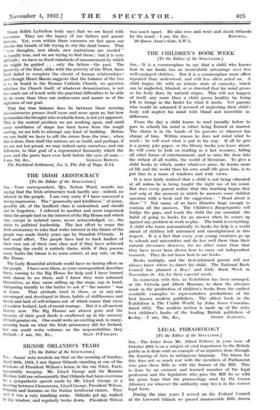THE CHILDREN'S BOOK WEEK
[To the Editor of the SPECTATOR.] SIR,—It is a commonplace to say that a child who knows how to use books has an incalculable advantage over less well-equipped children. But it is a commonplace more often repeated than understood, and still less often acted on. A child begins life with an infinite store of curiosity, which can be neglected, blunted, or so directed that his mind grows as his body does, by natural stages. This will not happen 'of itself, any more than a child grows healthy by being left to forage in the larder for what it needs. Yet parents who would be ashamed if accused of neglecting their child's body will neglect his mind with bland and incredible in- difference.
From the day a child learns to read (usually before he goes to school) his mind is either being formed or marred. The choice is in the hands of his parents or whoever has .charge of him. Within reason he does not mind what he reads ; he will read what is put in his way. If all he gets is a penny joke paper, or the library books you leave about, he will come to look on reading as a last resource, failing all other forms of entertainment, and so miss the door into the richest of all worlds, the world of literature. To give a child books in which, under whatever guise, he learns more of life and the world than his own small life gives him, is to put him in a room of windows and wide views.
It is now fairly realized that a child is not being educated at all unless he is being taught the right use of his mind. But does every parent realize that this teaching begins first and only at the moment in which he answers some childish question with a book and the suggestion : "Read about it there " ? Not many of as have libraries large enough to contain all the answers. The Children's Encyclopaedia will bridge the gaps, and teach the child the one essential—the habit of going to books for an answer when he comes up against any problem in work or play. The habit is everything. A child who turns automatically to books for help is a world ahead of children left untrained and unenlightened in this respect. It is a fact that every year young creatures go up to schools and universities and do less well there than their natural cleverness deserves, for no other cause than that they have never been shown how to carry out independent research. They do not know how to use books.
Books multiply, and the best-informed parent will not alivays know where to direct his child. The National Book Council has planned a Boys' and Girls' Book Week in November (6-12) for their especial needs.
In connexion with this, an Exhibition has been arranged, at the Victoria and Albert Museum, to show the advance made in the production of children's books from the earliest available examples to representative productions of the best known modern publishers. The oldest book in the Exhibition is The Visible World, by John Amos Comenius, dated 1672. The modern section is made up of the sixty best children's books of the leading British publishers of










































 Previous page
Previous page